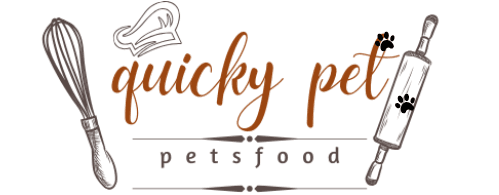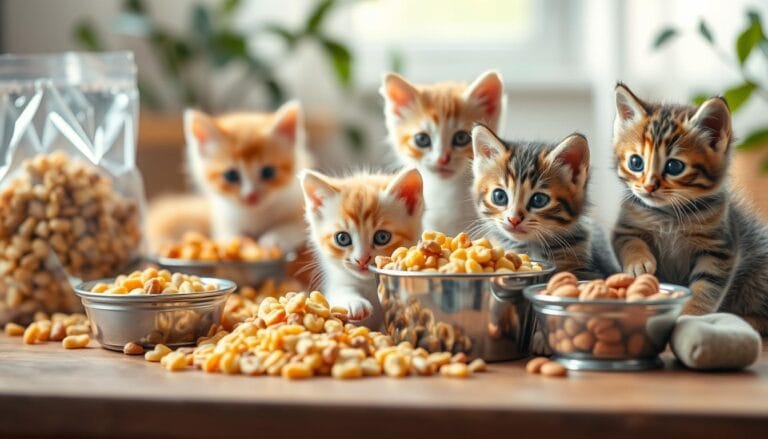Vet-Approved Homemade Cat Food Recipes
Table of Contents
As a cat guardian, you aim to provide only the finest care for your feline friend. Preparing homemade cat food is an excellent way to ensure they enjoy a balanced and nutritious diet. In this guide, you’ll discover vet-approved recipes and essential insights into feline nutrition.
Learn how to create tasty and wholesome meals for your cat. Understand the advantages of homemade food and the potential risks of inadequate nutrition.. Get expert advice on making safe, healthy food for your furry friend.
Key Takeaways
- Discover vet-approved homemade cat food recipes for a balanced, nutritious diet
- Understand the importance of essential nutrients your cat needs daily
- Explore the benefits of homemade cat food and the risks of nutritional deficiencies
- Learn veterinary guidelines for making safe and healthy homemade cat food
- Discover essential ingredients and preparation methods for optimal feline health
Understanding the Importance of Balanced Cat Nutrition
Offering the right nutrition is vital for maintaining your cat’s well-being and overall happiness.. As a responsible pet owner, knowing what your cat needs is crucial. A balanced diet supports growth, keeps the immune system strong, and more. Let’s look at the risks of not getting enough nutrients and the benefits of vet approved homemade cat food recipes or homemade cat food to gain weight.
Essential Nutrients Your Cat Needs Daily
Cats need specific nutrients found mainly in animal proteins.A balanced diet consists of high-quality proteins, fats, carbohydrates, vitamins, and minerals. Here’s what your cat requires:
- Protein (for muscle growth and maintenance)
- Fatty acids (for skin and coat health)
- Vitamins A, B, C, D, E, and K play a vital role in supporting your cat’s health.
- Minerals like calcium, phosphorus, and potassium
Risks of Nutritional Deficiencies
Not getting the right nutrients can harm your cat’s health. Lack of proteins, vitamins, or minerals can cause stunted growth, weak immune function, vision problems, and organ damage. It’s important to give your cat a balanced diet to avoid these issues and keep them healthy.
Benefits of Homemade Cat Food
Many vets suggest homemade cat food over commercial food, especially for cats with special needs or weight issues. Homemade recipes let you choose the best ingredients for your cat. This way, you can make sure they get the nutrients they need. Preparing meals at home can also improve your cat’s appetite, energy, and coat condition.
| Nutrient | Importance | Potential Deficiency Symptoms |
| Protein | Muscle growth and maintenance, immune function | Muscle wasting, poor wound healing, susceptibility to infections |
| Fatty Acids | Skin and coat health, energy production | Dry, flaky skin, dull coat, poor thermoregulation |
| Vitamins | Vision, bone development, red blood cell production | Night blindness, skeletal deformities, anemia |
| Minerals | Bone strength, fluid balance, nerve function | Weak bones, muscle spasms, neurological issues |
Veterinary Guidelines for Making Homemade Cat Food
Making homemade cat food needs careful attention to ensure your cat gets the right nutrients. Veterinary experts have set guidelines to help you make healthy meals at home. By following these tips, you can make food that keeps your cat healthy and happy.
Keeping the right balance of nutrients is key. Cats need high-quality proteins, vitamins, minerals, and fats. Vets say it’s important to stick to the right amounts to avoid health problems.
- Protein should make up 25-30% of the total recipe, sourced from lean meats, poultry, or fish.
- Fats should account for 20-30% of the total calories, with a focus on omega-3 and omega-6 fatty acids.
- Carbohydrates should be limited to 0-10% of the recipe, as cats are obligate carnivores.
- Vitamins, minerals, and other essential nutrients must be supplemented to ensure complete and balanced nutrition.
Following vet guidelines also ensures your cat food is safe and of high quality. It’s important to prepare, store, and handle food properly. This way, you can give your cat a homemade diet that’s good for their health.
- Preparing homemade cat food with vet advice is an excellent way to ensure the best care for your feline. By following these guidelines, you can make tasty, healthy meals that meet your cat’s special needs.
- Essential Ingredients for Healthy Homemade Cat Food
- When making homemade cat food, knowing the key ingredients is vital. These include essential proteins, vitamins, and minerals. Each one is crucial for your cat’s health and longevity. Let’s explore the must-haves for healthy cat food recipes.
- Protein Sources and Requirements
- Protein is the base of your cat’s diet, helping with muscle growth and repair. Choose high-quality proteins like chicken, turkey, beef, or fish. This ensures your cat gets all the amino acids they need. Cats should get about 30-40% of their calories from protein.
- Necessary Vitamins and Minerals
- Cats need a balanced mix of vitamins and minerals to stay healthy. Add vitamins A, B, C, D, E, and K, along with minerals like calcium, phosphorus, iron, and zinc. These nutrients boost the immune system, support strong bones, and keep organs working well.
- Healthy Fats and Omega Supplements
- Fats are key for your cat’s energy and skin health. Use healthy fats like salmon oil, flaxseed, or coconut oil. These provide omega-3 and omega-6 fatty acidsThey assist in lowering inflammation and enhancing overall health.
- By using these essential ingredients, you can make homemade cat food that’s both nutritious and delicious. It will help keep your feline friend healthy and happy for years to come.
- Basic Equipment and Preparation Methods
- Making tasty homemade cat food is more than just using good ingredients.You also require the proper tools and techniques.
- This ensures your cat gets a balanced and nutritious meal. Let’s look at the basic tools and methods for making homemade cat food that’s safe and tasty.
- Baking sheets or pans for cooking and freezing the food
Preparation Techniques
- Thorough Cooking: Make sure all meat, fish, and poultry are cooked well. This kills harmful bacteria and makes the food safe for your cat.
- Proper Portioning: Divide the homemade cat food into individual servings. This makes it easy to store and reheat, making mealtime simple.
- Careful Handling: Always keep good hygiene, like washing hands and sanitizing surfaces. This prevents cross-contamination and keeps your cat’s food safe.
With the right tools and these preparation methods, you can make homemade cat food confidently. It will meet your cat’s nutritional needs and be a delicious, healthy meal. Remember, the key is to focus on food safety and portioning. This way, your cat will enjoy every bite.
Simple Raw Cat Food Recipes
It’s important to give your cat a diet that’s both balanced and nutritious. Luckily, there are many tasty and easy raw cat food recipes. These recipes can meet your cat’s dietary needs. Let’s look at some popular ones:
Chicken and Fish Blend
This recipe combines chicken’s protein with fish’s omega-3 fatty acids. Just mix together:
1 pound boneless, skinless chicken, diced
1 pound boneless, skinless fish fillets (such as salmon or tilapia), diced
1 cup cooked brown rice
1 tablespoon ground eggshell powder (for calcium)
1 teaspoon fish oil (for essential fatty acids)
Feed this blend to your cat for a mix of essential nutrients in every bite.
Turkey and Liver Mix
Try this turkey and liver mix for a richer, organ-meat-based recipe. It’s full of protein and vitamins:
1 pound ground turkey
1/2 pound beef or chicken liver, diced
1/4 cup cooked oats
1 tablespoon bone meal (for calcium)
1 teaspoon cod liver oil (for vitamins A and D)
This mix is both nutritious and tasty for your cat.
Salmon Supreme Recipe
If your cat loves seafood, the Salmon Supreme recipe is perfect. It includes:
1 pound wild-caught salmon, diced
1/2 cup cooked brown rice
1 tablespoon ground eggshell powder
1 teaspoon salmon oil (for omega-3s)
The salmon offers lots of protein. The essential oils and eggshell powder ensure your cat gets the nutrients they need.
These simple raw cat food recipes are not only tasty but also nutritious.Be sure to consult your veterinarian before making any changes to your cat’s diet.Cooked Homemade Cat Food Recipes
Looking to switch your cat to homemade food? Cooked cat food recipes are tasty and healthy. They offer a great alternative to raw diets and can meet your cat’s health needs or food allergies.
The Chicken and Brown Rice Stew is a great choice. It mixes shredded chicken, brown rice, and veggies like carrots, peas, and spinach. This stew is cooked until the ingredients are soft and easy for your cat to digest.
The Beef and Barley Casserole is another hearty option.This recipe blends ground beef, barley, and vegetables into a flavorful meal.
4o
. This recipe is packed with protein, fiber, and important nutrients.
For cats who love seafood, the Tuna and Sweet Potato Bake is perfect. It blends canned tuna, sweet potatoes, and olive oil for a protein-rich meal. It’s also easy on your cat’s stomach. When making homemade cat food, it’s important to consult your vet. They can ensure your cat receives all the necessary nutrients.
With the right recipes and care, you can give your cat a delicious, healthy homemade diet.
Supplementing Your Homemade Cat Food
Making homemade cat food is a smart way to give your cat the nutrients they need. But, it’s key to add supplements to fill any diet gaps. This way, you can boost your cat’s health and happiness.
Essential Supplements Guide
When you make homemade cat food, think about adding these key supplements. They help make a complete and balanced diet:
Taurine: This amino acid is key for a cat’s heart and eyes. Use a high-quality taurine powder or liquid.alcium and phosphorus are essential minerals that support healthy bones and teeth.
Use calcium carbonate or bone meal supplements.
Vitamin B12: Also known as cobalamin, it helps make red blood cells and supports the nervous system. A B12 supplement can prevent deficiencies.
Vitamin D: This vitamin helps with calcium absorption and overall health. Consider a vitamin D3 supplement.
Natural Food Additives
You can also add natural food additives to your homemade cat food to gain weight or for health reasons:
Omega-3 and Omega-6 fatty acids: Found in fish oils, these healthy fats are good for skin, coat, and heart health.
Probiotics: These beneficial gut bacteria help with digestion and immune function. Look for probiotic supplements or fermented foods.
Organ meats: Rich in vitamins and minerals, organ meats like liver and heart can be added to your cat’s diet.
Bone broth: Bone broth is a natural source of collagen, gelatin, and minerals. It can be used to add moisture and nutrients to cat supplements.
By choosing and adding the right supplements and natural additives, you can make sure your homemade cat food is complete and balanced.This helps ensure your feline companion stays healthy and content.
Storage Tips and Food Safety Guidelines
Keeping your homemade cat food fresh and safe is key for your cat’s health. It’s vital to store it right to keep the meals fresh and full of nutrients. Cooked food should stay in the fridge for 3-5 days Raw food can be stored in the freezer for 3 to 4 months.
Always prepare your cat’s food in a clean, sanitized area. Wash your hands, utensils, and surfaces well to avoid bacteria. Use airtight containers or freezer bags and label each batch with the date you made it.
Following these tips ensures your cat food recipes and homemade food for cats are tasty and safe. Good food handling and storage keep your cat healthy and prevent food illnesses.
FAQ
What are the benefits of homemade cat food?
Homemade cat food offers a balanced and nutritious diet for your cat. You can choose fresh, high-quality ingredients. This ensures your cat gets the best nutrition for their health.
How do I ensure my homemade cat food is balanced and complete?
To make sure your cat’s food is balanced, follow veterinary guidelines. Use the right amounts of protein, vitamins, minerals, and fats. A vet or pet nutritionist can help you create the perfect recipe for your cat. What key nutrients do cats require in their daily diet? Cats need certain nutrients to stay healthy. They need high-quality proteins, essential fatty acids, vitamins A, B, and E, and minerals like calcium and phosphorus. Taurine is also key for their health.
Can homemade cat food help my cat gain weight?
Yes, homemade cat food can help your cat gain weight if needed. Use nutrient-rich ingredients and healthy fats. This way, you can provide the extra calories and nutrients for a healthy weight.
How do I properly store homemade cat food?
Storing homemade cat food correctly is important. Keep cooked or raw meals in airtight containers in the fridge for 3-5 days. For longer storage, freeze in portions and thaw as needed. This can keep the food safe for months.





